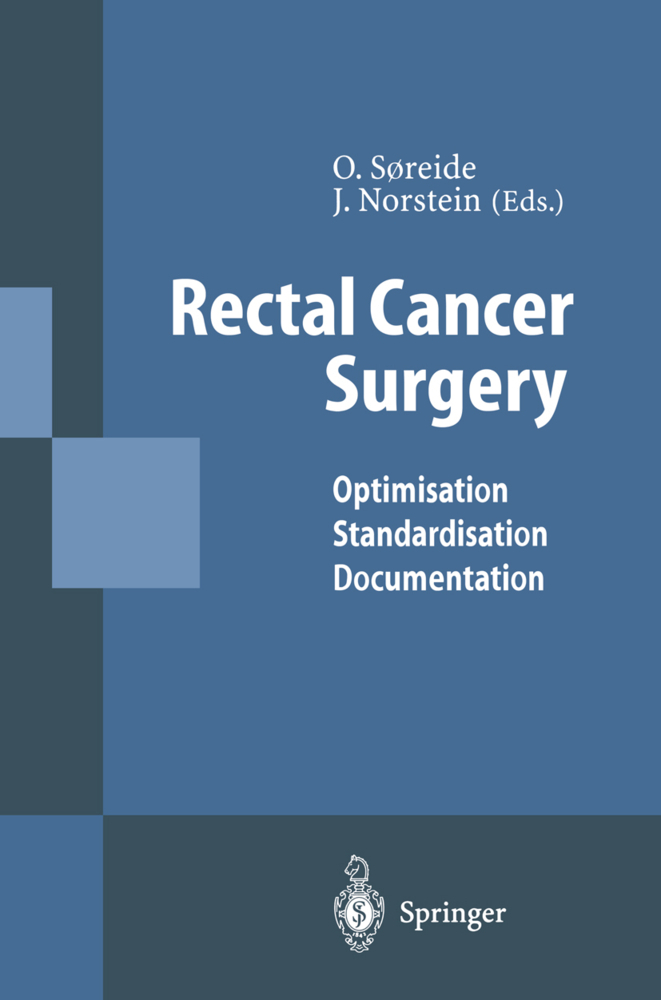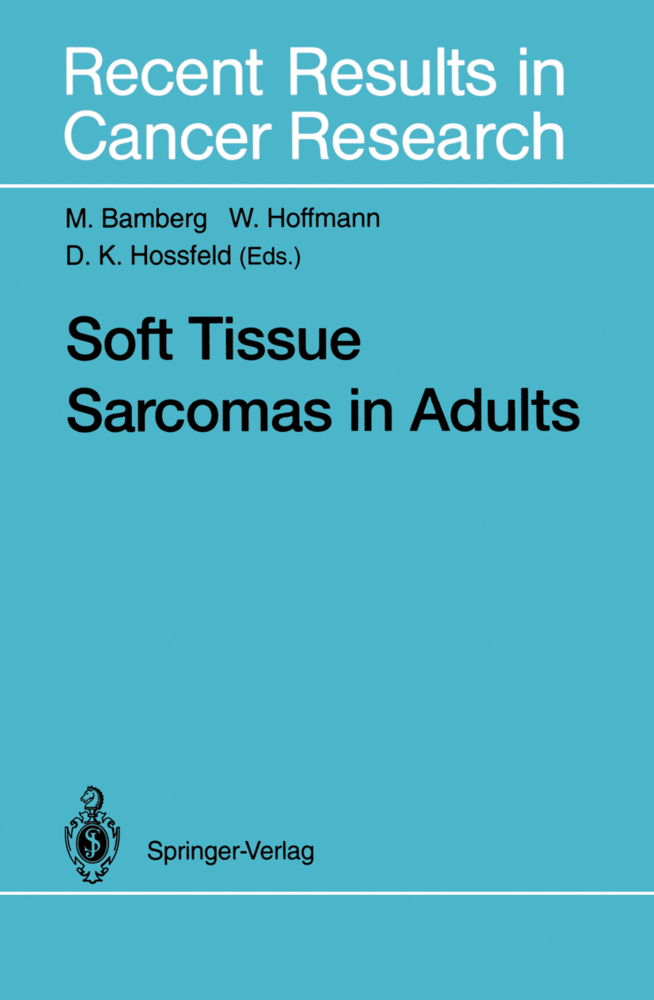Rectal Cancer Surgery
Optimisation - Standardisation - Documentation
Rectal Cancer Surgery
Optimisation - Standardisation - Documentation
Rectal cancer is a major killer. Most of those dying after curative surgery suffer from recurrent disease in the pelvis. Local recurrence is also the only site of failure in up to 50% of patients. A disturbing fact is that the local recurrence rate shows considerably surgeon-related variances. There is now strong evidence that optimizing surgical technique by adopting the principle of total mesorectal excision (TME) will reduce local failure rate, increase the use of sphincter-saving operations, and improve functional results. Surgeons applying this surgical principle will consistently achieve similarly low recurrence rates.
2 Results of Rectal Cancer Treatment: A National Experience
3 Failure After Curative Surgery Alone
Tumour Staging
4 Staging Systems - A Review
5 Limitations of Existing Systems of Staging for Rectal Cancer: The Forgotten Margin
6 Preoperative Staging: A Critical Analysis
7 Potential of Molecular Biology in Preoperative Evaluation
The Anatomical Basis for Rectal Cancer Surgery
8 Rectal and Pelvic Anatomy with Emphasis on Anatomical Layers
9 Regional Anatomy of the Male Pelvic Nerve Plexus: Composition, Divisions and Relationship to the Lymphatics
10 Anatomical Basis of Total Mesorectal Excision and Preservation of the Pelvic Autonomic Nerves in the Treatment of Rectal Cancer
Tumour Spread As a Basis for Rectal Cancer Surgery
11 Spread of Rectal Carcinomas
12 Importance of Lymphatic Spread
13 The Lymphatic Spread of Rectal Cancer and the Effect of Dissection: Japanese Contribution and Experience
Surgical Technique - Options
14 Surgical Options in Rectal Cancer
15 Total Mesorectal Excision: History and Anatomy of an Operation
16 Total Mesorectal Excision with Pelvic Autonomic Nerve Preservation in the Operative Treatment of Rectal Carcinoma
17 Nerve-Sparing Surgery: Surgical Neuroanatomy and Techniques
18 Lateral Node Dissection - A Critique
19 Laparoscopic Approaches to Malignant Disease
20 Laparoscopic Resection of Rectal Cancer: Short and Long Term Results
Reconstruction
21 Straight Colorectal and Coloanal Anastomosis
22 The Pelvic Pouch
23 Colonic J-Pouch or Straight Anastomosis in Low Anterior Resection for Rectal Carcinoma?
24 Role of a Protecting StomaAfter Rectal Resection for Cancer
Outcome
25 Functional Results Following Rectal Surgery: A Review
26 The Effect of Specialization or Organization of Rectal Cancer Surgery
27 Surgery for Rectal Cancer: The Relationship Between Treatment Volume and Results
The Role of Adjuvant Treatment if Surgery Is Optimal
28 Role of Radiotherapy in Addition to Optimal Surgery
29 Adjuvant Therapy for Rectal Cancers When Surgical Therapy Is Optimal
30 The Role of Adjuvant Treatment if Surgery Is Optimal: A Clinical Epidemiologist's View
International Standardization and Research Strategies
31 International Standardization and Documentation of the Treatment of Rectal Cancer.
Rectal Cancer - Natural History of the Disease
1 Cancer of the Rectum: Epidemiology, Improvement in Survival and the Role of a National Cancer Registry2 Results of Rectal Cancer Treatment: A National Experience
3 Failure After Curative Surgery Alone
Tumour Staging
4 Staging Systems - A Review
5 Limitations of Existing Systems of Staging for Rectal Cancer: The Forgotten Margin
6 Preoperative Staging: A Critical Analysis
7 Potential of Molecular Biology in Preoperative Evaluation
The Anatomical Basis for Rectal Cancer Surgery
8 Rectal and Pelvic Anatomy with Emphasis on Anatomical Layers
9 Regional Anatomy of the Male Pelvic Nerve Plexus: Composition, Divisions and Relationship to the Lymphatics
10 Anatomical Basis of Total Mesorectal Excision and Preservation of the Pelvic Autonomic Nerves in the Treatment of Rectal Cancer
Tumour Spread As a Basis for Rectal Cancer Surgery
11 Spread of Rectal Carcinomas
12 Importance of Lymphatic Spread
13 The Lymphatic Spread of Rectal Cancer and the Effect of Dissection: Japanese Contribution and Experience
Surgical Technique - Options
14 Surgical Options in Rectal Cancer
15 Total Mesorectal Excision: History and Anatomy of an Operation
16 Total Mesorectal Excision with Pelvic Autonomic Nerve Preservation in the Operative Treatment of Rectal Carcinoma
17 Nerve-Sparing Surgery: Surgical Neuroanatomy and Techniques
18 Lateral Node Dissection - A Critique
19 Laparoscopic Approaches to Malignant Disease
20 Laparoscopic Resection of Rectal Cancer: Short and Long Term Results
Reconstruction
21 Straight Colorectal and Coloanal Anastomosis
22 The Pelvic Pouch
23 Colonic J-Pouch or Straight Anastomosis in Low Anterior Resection for Rectal Carcinoma?
24 Role of a Protecting StomaAfter Rectal Resection for Cancer
Outcome
25 Functional Results Following Rectal Surgery: A Review
26 The Effect of Specialization or Organization of Rectal Cancer Surgery
27 Surgery for Rectal Cancer: The Relationship Between Treatment Volume and Results
The Role of Adjuvant Treatment if Surgery Is Optimal
28 Role of Radiotherapy in Addition to Optimal Surgery
29 Adjuvant Therapy for Rectal Cancers When Surgical Therapy Is Optimal
30 The Role of Adjuvant Treatment if Surgery Is Optimal: A Clinical Epidemiologist's View
International Standardization and Research Strategies
31 International Standardization and Documentation of the Treatment of Rectal Cancer.
| ISBN | 978-3-642-64438-2 |
|---|---|
| Artikelnummer | 9783642644382 |
| Medientyp | Buch |
| Auflage | Softcover reprint of the original 1st ed. 1997 |
| Copyrightjahr | 2012 |
| Verlag | Springer, Berlin |
| Umfang | XVI, 457 Seiten |
| Abbildungen | XVI, 457 p. |
| Sprache | Englisch |










